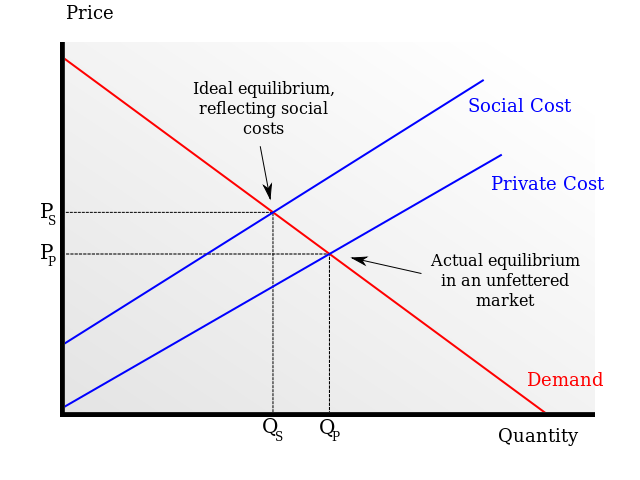In the B Team post on capitalism, I talked about externalities and transaction costs and how companies should factor these costs into the prices they charged and that we as consumers should be happy to pay these costs, this is of course, if you are serious about re-forming capitalism. Here is a primer on what I think is the justification behind this theory.
Before we get into technicalities, I think I should state upfront, sometimes, economics come across as soul less, value-neutral and cruel almost in its assessment of life as we know it. If you have read Undercover Economist by Tim Harford, some of the scenarios are direct and very tongue in cheek – how do you get desired outcomes i.e. optimal behaviour from your kids – withhold the reward or threaten with punishment? (the answer is withholding rewards by the way). Economists can be very blunt and rarely if ever, sugar coat what they think the truth is. They tell it like it is and use various frameworks and theories to explain the way the world works. But economics is just that. a way to view the world.
An easier way to think about this is like a photographer and his / her camera. The photographer is the economist and sees the world a certain way, the equipment they choose to show that and portray that is the economics methodology or school of thought that either best fits or is their preferred theory. But always, the humanity behind the viewfinder will always affect the picture no matter what lens you use. This is economics, we should not forget its humanity.
Of course, with humanity, comes inevitable fallibility. A lot of economics is based on assumptions – let’s think about cost-benefit analysis for example, who benefits and who loses are based on assumptions you make about everyone’s starting position and incentives which invariably affect the outcomes.
A stark example of course is an obsession with projects like building stadiums and sponsoring private industry and how this will create increased incomes for all involved. FIFA and Brazil springs to mind here. If you delve deeper beneath these projects and their projected incomes and benefits for all, things can easily fall apart based on what you believe. You can skew the numbers based on your assumptions and who benefits is anyone’s game.
Anyway, back to the task at hand. Let’s assume everything is a market, the demand is made up of consumers like you and me, and suppliers as all the companies. Assume that suppliers’ main purpose is to make a profit, selling to us consumers at the price we demand goods at. Now the B-Team is saying that companies’ purpose should be a world in which the purpose of business is to be a driving force for social, environmental and economic benefit.
Really, all this means is that hey, businesses, you are not taking into account your social costs when you are doing business. You have only factored in the private cost of doing business: So, what companies should do is be considering and quantifying their impact on social, environmental and economic costs and incorporating that into their balance sheets. You can raise prices of course but you lose customers. I am assuming that sales will stay the same but costs will increase.
So, what companies should do is be considering and quantifying their impact on social, environmental and economic costs and incorporating that into their balance sheets. You can raise prices of course but you lose customers. I am assuming that sales will stay the same but costs will increase.
How might this work in real life? Let’s think about profit – profit is made up of Revenue less Costs. Revenue = sales which is price x quantity and costs are the things like production costs etc. So what the B Team is essentially saying or should be doing if they want to achieve this goal is to change the profit function to the following:
Profit = Revenue – (Production Cost + Social Cost)
This of course, negatively affects profit. Will the B-Team be happy to take this hit? I am not so sure. But if they are to walk the talk – then their balance sheet and financials should be done according to the following formula.
Most often, what happens is that if there is a social cost, companies rarely if ever, internalise it i.e. incorporate it into their costs. They put a premium on price and justify it saying that you the consumer should internalise this cost because it will make you feel good. Things like Fair Trade etc spring to mind, charging a premium for raw goods with no value add – an oversimplification for sure, but something that niggles at me – if fair trade is good, it should be the default not the add on premium option.
If the B Team is serious about making a real difference then we really need to have an honest debate on who internalises the extra social cost – the consumer or the producer? You or me? How are we going to work together to really understand the production process and the humans behind it? Why is fair trade not the status quo? Why can’t everything be produced ethically and without undermining someone else? Should we let the assumptions of others decide how allocation happens? What happens if the allocation isn’t fair, who is in charge of redistribution?
We don’t need more feel-good videos and nice sound bites. We need to ask the hard questions and this needs to start now.